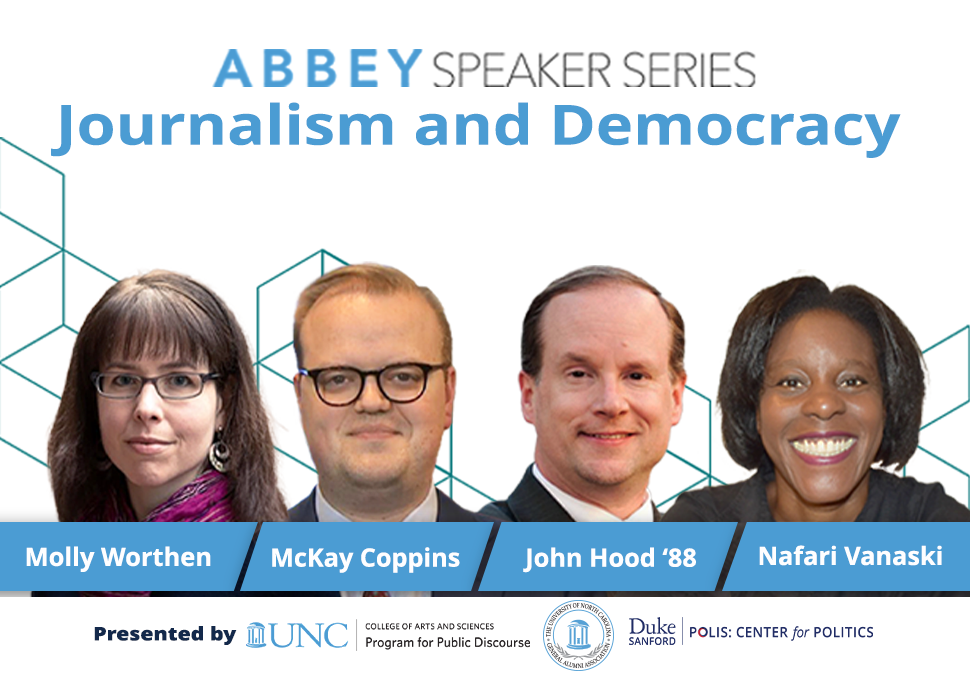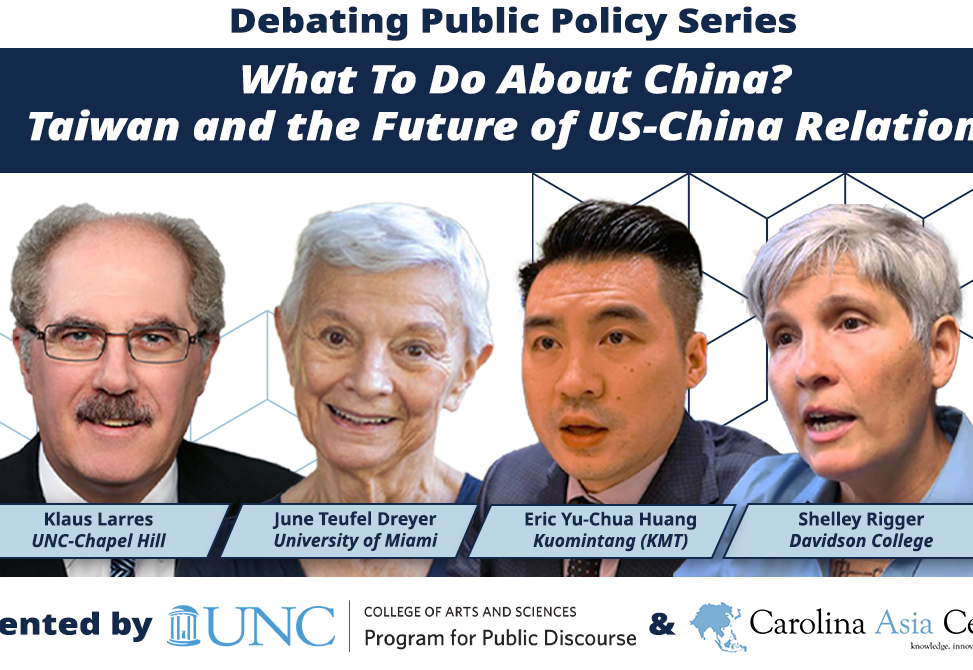Blog
Blog
Abbey Speaker Series: A Conversation with Frank Bruni and Bari Weiss
January 22, 2024
By Eric Johnson
Avoiding an ideological echo chamber is a challenge for readers and journalists alike, said Free Press founder and former New York Times opinion columnist Bari Weiss. As part of a wide-ranging conversation with UNC alumnus and New York Times columnist Frank Bruni, Weiss talked about the problem of “audience capture” and the difficulty of offering diverse viewpoints when so many news consumers want to see their opinions affirmed.
“It’s incredibly important to sharpen your position by reading the best proponents from the other side,” Weiss said. She founded her own news outlet to “inform readers, treat them like adults, and allow them to make their own choices.”
Weiss resigned from the Times in 2020 over what she called an “illiberal environment” and a growing trend of self-censorship on sensitive topics. If ‘sense-making’ institutions like the media and universities give in to ideological conformity, Weiss warned, they lose claims to public trust. “Americans still hunger for news that is accurate, opinions that are vital, and debate that is sincere,” she wrote in her Times resignation letter, and that’s the case she made to an audience of students, faculty, and community members at the Carolina Union.
The audience also included a vocal cadre of protestors who objected to Weiss’s views about Israel’s war in Gaza, which Weiss sees as a legitimate exercise in self-defense. About twenty minutes into the discussion, a group of protestors began shouting over the speakers and were asked to leave.
After the brief interruption, Weiss said she wished the protestors had chosen to stay and have the kind of challenging dialogue her work promotes. She offered her own nuanced take on Israeli policy, the wrenching calculations leaders make in wartime, and the distinction between supporting Palestinians and sympathizing with an extremist group like Hamas.
“It was hard for me to understand what exactly those students were supporting and if they were here, we could talk,” Weiss said. “I consider myself pro-Palestinian in the sense that I want people that live in Gaza and the West Bank to live freely and enjoy the rights that I, as a gay and Jewish woman, get to enjoy in this country.”
Reflecting on the pressures that students might feel to have strident views about current events, Bruni called for professors and public officials to model intellectual humility, sharing examples of when they’ve been wrong and openly acknowledging conflicted views. “I want to popularize the phrase, ‘I don’t know,’” Bruni said. “Or, ‘I’m still figuring it out.’” Without protecting college as a time of curiosity and uncertainty, he said, students are tempted to “turn their political life into a performative thing.”
Weiss said aspiring journalists need open-minded curiosity above all else, because the core of the job is still trying to pursue the truth in a complex environment. “Tell me something new about the world that’s valuable to me,” Weiss advised.
Agora Fellows featured in the Well
On November 9th, Rob Holliday published a piece in The Well (UNC’s Faculty and Staff Newsletter) detailing how the Program for Public Discourse’s Agora Fellows “do democracy better.”
Sarah Crow, an Agora Fellow from last year’s cohort, had this to say: “If we don’t teach college students how to engage productively, civilly, respectfully, then we won’t be able to engage in the real world,” Crow said. “The purpose of a university is to talk about ideas, debate ideas in the pursuit of truth. And yet that happens on a pretty small scale. It’s imperative that we learn how to talk to each other, and how to listen to each other.”
Please click here to read the full article.
Community Event: War in Gaza
War in Gaza
by Eric Johnson
11/13/2023
It’s impossible to understand the current conflict in Israel and Gaza without knowing the deeper context, explained two UNC political scientists at a recent Program for Public Discourse event. In front of a packed lecture hall, Navin Bapat and Jeff Spinner-Halev walked through the origins of the Israeli-Palestinian conflict and the profoundly different perspectives that each side brings to that history.
Bapat and Spinner-Halev began by describing Israel’s creation in 1948, and the massive dislocation of Palestinians during the upheaval. Israelis celebrate this moment as a war for independence; Palestinians see it as a disaster of dispossession and humiliation. From that seed of profound disagreement, the conflict has hardened and undermined repeated attempts at a negotiated settlement.
“When people are under threat, their best selves do not come out,” Spinner-Halev said. “When people are threatened, when the threat is real and alive, their best selves to compromise and negotiate are just not on the table.”
Both professors talked about the ethics of warfare and how international rules for armed struggle might apply to the current fighting. Bapat is an expert in non-state actors and terrorism, and he explained that Hamas’s attack on Israeli civilians was an effort to spark a wider war. “The goal, essentially, is to provoke,” Bapat said. The brutality of Hamas’s assault was intentional, “a large, symbolic act of violence to try and provoke the Israelis into an indiscriminate response. Under those definitions, it looks like Hamas is accomplishing what it wanted.”
Spinner-Halev explained the legal and ethical implications of Israel’s campaign to eliminate Hamas from Gaza, including the right of self-defense but also the obligation to minimize civilian casualties. “The response has to be proportionate to the threat,” Spinner-Halev said. “Is this level of civilian death proportionate to the threat?” Those questions don’t have straightforward answers, meaning that the ethics of warfare in an urban setting like Gaza are “inherently ambiguous.”
Both scholars also cautioned against simplistic, binary thinking about the conflict. Hamas makes up only a small portion of the Palestinian population, Bapat emphasized, and political support for the movement was falling prior to the conflict. Spinner-Halev offered his view that Israel has a right to eliminate an existential threat from its borders, but also shared deep misgivings about the actions and strategy of the current Israeli government. It’s not enough to be pro-Israel or pro-Palestinian, both men said. You need a much more nuanced view of the interests and goals in play.
“You can make that distinction between the people, the government, and the state,” Spinner-Halev said. “We need people of goodwill on both sides to come together and find a solution. I’m on that side, and I urge you to be on that side, too.”

Across the Conversation – an overview of “Journalism and Democracy”

